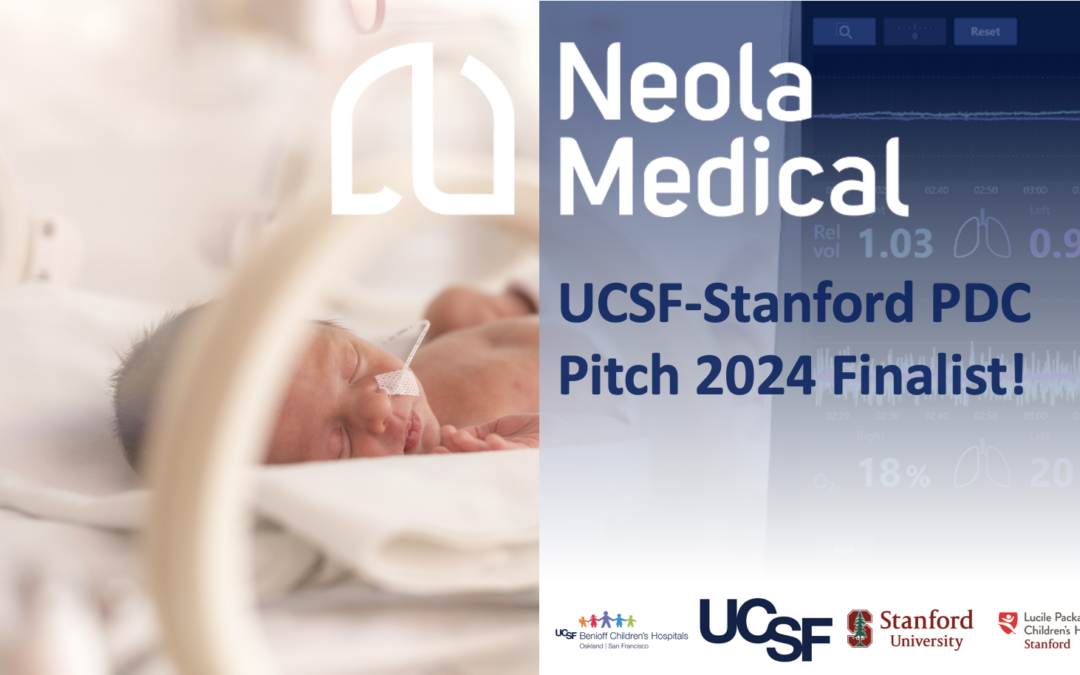Neola Medical’s product for lung monitoring of preterm born infants, Neola®, is one of ten innovations selected to be presented to a panel of judges at the Stanford Pediatric Device Consortium (PDC) Accelerator Pitch, to be held alongside the Michael R Harrison Innovation Symposium at the University of California, San Francisco (UCSF), USA, Mission Bay campus on Friday, March 22, 2024. Finalists will have the opportunity to win a PDC Accelerator Award, which includes funding of up to $100,000, mentorship, and tailored guidance and coaching for commercialization from Stanford’s team of leading experts in medical technology along with industry partners. A few selected participants will also be given the opportunity to be part of and work closely with the world-leading medical technology incubator, Fogarty Innovation Accelerator in the USA, with the aim of advancing their pediatric innovations and contributing to the promotion of pediatric healthcare.
The UCSF-Stanford Pediatric Device Consortium (PDC) Accelerator is a direct funding program targeting companies, innovators, and academic institutions based in the USA with a promising idea for a pediatric healthcare medical technology product that can enhance care for children. The program is offered once a year, and participants are selected through the PDC Accelerator Pitch Competition in March, with participation lasting for one year for accepted applicants who meet the FDA’s definition of a medical technology product. Opportunities are provided to collaborate with UCSF-Stanford PDC’s pediatric team and its advisors to develop the idea into a marketable product and to expedite its market availability for the benefit of patients.
“It’s an incredible honor to have been selected as a finalist for the UCSF-Stanford PDC Accelerator Pitch Competition 2024 and to be recognized as an innovative company that can improve pediatric healthcare. I look forward to presenting Neola® at the PDC Accelerator Pitch in San Francisco in March. The opportunity to showcase our medical technology product for non-invasive, continuous monitoring of lung function in preterm born infants in the USA is significant as we approach our commercial launch.”, says CEO Hanna Sjöström.
Thanks to funding from the U.S. Food and Drug Administration (FDA) through the Pediatric Device Consortia Grants Program, and generous support from the Frederick Gardner Cottrell Foundation and The Hooper Family, a total of $250,000 will be awarded in seed grants.
The ten finalists who will have the opportunity to pitch their innovation at the UCSF-Stanford PDC Accelerator Pitch Competition 2024 are as follows: Neola Medical, Inc. (Neola®), Bloom Standard (RAPIDScan), Heartpoint Global (IntelliStent), Gabi SmartCare Inc. (Pediarity), Monere Corp. (NiADA, Non-invasive Anemia Detection with AI), Esperto Medical, Inc. (cNIBP, Continuous Noninvasive & Calibration-free Pediatric Blood Pressure Monitor), Vascular Perfusion Solutions, Inc. (VP.S ENCORE PEDS), Stanford University & Impact1 (NEC Breath Test), TAKEOFF41, INC. (TPN2.0), and Dirac.
About the UCSF-Stanford Pediatric Device Consortium (PDC)
The University of California, San Francisco (UCSF) – Stanford Pediatric Device Consortium (PDC) remains one of the five centers participating in the national program aimed at accelerating the development and availability of medical devices specifically designed for children. The UCSF-Stanford Pediatric Device Consortium (PDC) has received $7.4 million from the FDA over the next 5 years to facilitate the development of innovative medical devices specifically intended for children. There is a critical need for new medical devices designed specifically for the unique needs of children, and the FDA launched the Pediatric Device Consortia (PDC) Grants Program in 2009 to address this. As one of the first PDCs, UCSF has been a leading institution since 2009, and the grant award in 2023 makes UCSF the longest continuously funded consortium of its kind, with a successful track record of supporting several hundred pediatric innovations on their path to commercialization and patient access. In 2018, UCSF PDC merged with Stanford University to expand it into UCSF-Stanford PDC.
